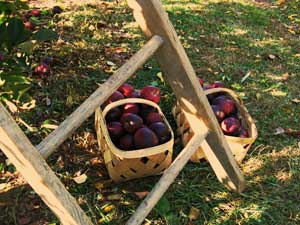Is Doing Chores Your Workout?
By: Petra Timmermans, PT
Boundary Community Hospital Rehabilitation Services Manager
 Fall is a busy season for Boundary County residents preparing for winter. Lots of snow is predicted and time is ticking – we need to get things in order! The physical therapists in the Rehabilitation Department at Boundary Community Hospital routinely treat injuries that are related to activities around the house this time of year:
Fall is a busy season for Boundary County residents preparing for winter. Lots of snow is predicted and time is ticking – we need to get things in order! The physical therapists in the Rehabilitation Department at Boundary Community Hospital routinely treat injuries that are related to activities around the house this time of year:
- Cutting, splitting and stacking wood: People can easily hurt their backs; wood is heavy and is usually on the ground. Avoid twisting when lifting and stacking wood – turn with a straight body using your legs. Use a good chopping technique to avoid back or shoulder injuries and consider alternatives – rolling, tipping wood on its high side and ….. be careful with chainsaws.
- Pulling up the garden: weed/plant pulling is hard on your back and knees. Divide this chore over several days. Sit on your knees or use a chair for some of the pulling.
- Outside painting: Limit overhead painting to avoid neck and shoulder strain: adjust the ladder, use a scaffold and try to paint at eye level or lower.
- Picking and gathering fruit: Over-reaching when picking fruit can hurt your shoulder or back. Move your ladder often, making sure it has stable footing before you climb, and always have the ladder or a branch to hold on to. Never stand on the top step.
- Cleaning gutters: To avoid losing your balance and grabbing for the gutter or falling off the ladder, use a tall, stable ladder that doesn’t need to be moved often to reach the gutter.
- Raking leaves: To prevent back and buttock strain from twisting and rotating repetitively in the same direction, switch sides and use the rake in the other hand. Better yet, use a leave blower.
- Pruning: Pruning overhead with force puts the rotator cuff muscles in the shoulder at high risk for injury. Use a good quality pruner that can telescope. Hand pruners/clippers strain wrists and hands. Take breaks to stretch your wrists and fingers.
Many injuries can be prevented with preparation and attention. Here are some additional tips:
- Take some deep breaths before beginning to oxygenate the blood and help focus on the task.
- Stretch. Stretching out your muscles and doing a quick warm-up will loosen up muscles in preparation for your chores.
- Be prepared: have your tools close by and at the right height, have stable footing and/or a steady ladder; be positioned so you aren’t reaching too high or too low.
- Remember to lift with your legs not your back.
- Carry items close to your body at waist height.
- Don’t twist while lifting or carrying, turn your whole body by moving your feet.
- Don’t overload your arms, shovel, wheelbarrow or whatever you carry. It may take more trips but your back with thank you.
- Rotate activities. Rake leaves for a while, carry wood for a while, etc.
- Use the right tools for the right job: don’t prune big branches with a small clipper, or small branches with a heavy pruner.
- Don’t throw or swing anything heavy: logs, hay.
Pain-free movement is crucial to your quality of daily life, ability to earn a living, the pursuit of leisure activities, and much more; so please be careful when you begin your winter chores.
Physical Therapists can improve mobility and motion as well as long term pain management. Talk with your physician about all the ways a physical therapist can help.

Leave a Reply
Want to join the discussion?Feel free to contribute!